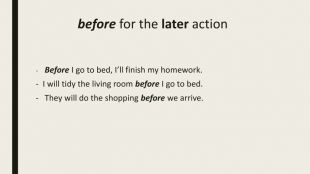Презентація "Future Time Clauses"
Про матеріал
Презентація граматичного матеріалу - схематичне пояснення Future Time Clauses у слайдах з наведеними прикладами Перегляд файлу
Зміст слайдів
pptx
До підручника
Англійська мова (9-й рік навчання) 9 клас (Несвіт А.М.)
Оцінка розробки


Безкоштовний сертифікат
про публікацію авторської розробки
про публікацію авторської розробки
Щоб отримати, додайте розробку
Додати розробку














